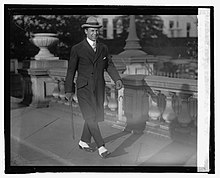Robert Woods Bliss
| Robert Woods Bliss | |
|---|---|
 |
|
| Born |
5 August 1875 St. Louis, Missouri |
| Died | 19 April 1962 (aged 86) Washington, D.C. |
| Residence | Dumbarton Oaks |
| Nationality | American |
| Alma mater | Harvard College, B.A., 1900 |
| Occupation |
Foreign Service Officer Ambassador art collector art historian |
| Known for | cofounder, Dumbarton Oaks Research Library and Collection |
| Home town | St. Louis, Missouri |
| Title |
U.S. Envoy to Sweden U.S. Ambassador to Argentina |
| Political party | Republican |
| Spouse(s) | Mildred Barnes Bliss b. 1879, m. 1908 |
| Children | none |
| Parent(s) | William Henry Bliss, an attorney Anna Louisa Woods Bliss |
| Notes | |
Robert Woods Bliss (5 August, 1875 – 19 April 1962) was an American diplomat, art collector, philanthropist, and one of the cofounders of the Dumbarton Oaks Research Library and Collection in Washington, D.C.
Bliss was born in St. Louis, Missouri on August 5, 1875, the son of William Henry Bliss (1844–1932), a U.S. Attorney, and Anna Louisa Woods Bliss (b. 1850) and the brother of Annie Louise Bliss Warren (1878–1964). When his father remarried in 1894, he became the stepson of Anna Dorinda Blaksley Barnes Bliss (1851–1935) and the stepbrother of Cora (Kora) Fanny Barnes (1858–1911) and Mildred Barnes (1879–1969). He attended J. P. Hopkinson’s Private School in Boston (1894–1895) and received his B.A. in 1900 from Harvard College, where he was a member of the Owl Club. Bliss married Mildred Barnes in 1908.
After graduating from college, Bliss went to work in Puerto Rico, first in the office of the secretary of the U.S. civil government there, then as private secretary to the governor of Puerto Rico (1901–1903). He passed the State Department qualifying examination in 1903 and entered diplomatic Foreign Service. As a career diplomat and Republican, Bliss served as U.S. consul in Venice (1903); second secretary to the U.S. embassy in St. Petersburg (1904–1907); secretary of the legation in Brussels (1907–1909); secretary of the legation in Buenos Aires (1909–1912); secretary of the United States embassy in Paris (1912–1916); and counselor of the embassy in Paris (1916–1919). In 1908 he was a delegate to the international conference to consider revision of the arms and ammunition regulations of the Brussels Conference Act of 1890, and in 1918 he was temporarily assigned to serve as chargé d’affaires at the U.S. legation in The Hague.
...
Wikipedia
